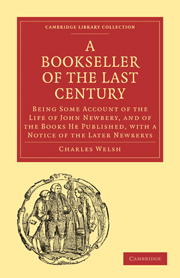 Bookseller of the Last Century
Bookseller of the Last Century Book contents
- Frontmatter
- PREFACE
- Contents
- LIST OF ILLUSTRATIONS
- CHAPTER I
- CHAPTER II
- CHAPTER III
- CHAPTER IV
- CHAPTER V
- CHAPTER VI
- CHAPTER VII
- APPENDICES
- Copy of the Will of John Newbery
- Catalogue of the Books published by the Newberys
- Some of the Newspapers with which J. Newbery was connected
- List of Newbery's Publications
- Mr J. M. W. Gibbs on Goldsmith, Johnson, and Newbery
- Dr Wm. Dodd, John Newbery, and the Christian Magazine
- Extracts from the Account Books of Benjamin Collins of Salisbury, referring to Works not published by the Newberys
- INDEX
- Plate section
Mr J. M. W. Gibbs on Goldsmith, Johnson, and Newbery
Published online by Cambridge University Press: 05 October 2010
- Frontmatter
- PREFACE
- Contents
- LIST OF ILLUSTRATIONS
- CHAPTER I
- CHAPTER II
- CHAPTER III
- CHAPTER IV
- CHAPTER V
- CHAPTER VI
- CHAPTER VII
- APPENDICES
- Copy of the Will of John Newbery
- Catalogue of the Books published by the Newberys
- Some of the Newspapers with which J. Newbery was connected
- List of Newbery's Publications
- Mr J. M. W. Gibbs on Goldsmith, Johnson, and Newbery
- Dr Wm. Dodd, John Newbery, and the Christian Magazine
- Extracts from the Account Books of Benjamin Collins of Salisbury, referring to Works not published by the Newberys
- INDEX
- Plate section
Summary
I should like to say in modification of my remark quoted in the note at ante, p. 36, a remark written two years ago, that I now believe Goldsmith's earliest connection with Newbery dates as far back as Nov. or Dec. 1757, when he first contributed to Newbery's Literary Magazine. What I should have said in the note cited is that the acquaintance with Johnson and Smollet led to Goldsmith's closer connection with Newbery, and so to the more important engagements between the two, which resulted in the production of the “Citizen of the World,” &c, &c. I think Goldsmith's acquaintance with Newbery through the Literary Magazine was but a slight one; if, indeed, it became a personal acquaintance at all. I think, as I have shown in my account of Goldsmith's earliest contributions to the Literary Magazine (see my vol. iv., p. 513, vol. v., pp., 7-59, etc.), that he most likely came on to that magazine as a volunteer, and when he in a few months became a regular contributor, it may be he saw and knew not much of Newbery, though he was taking Newbery's pay for his articles. The editor, probably Griffith Jones, was of course the go-between for such a case as this. Then, to prevent such acquaintance as there may have been between Goldsmith and Newbery at this period ripening, the magazine stopped in August, less than ten months after Goldsmith's earliest connection with it.
- Type
- Chapter
- Information
- Bookseller of the Last CenturyBeing Some Account of the Life of John Newbery, and of the Books He Published, with a Notice of the Later Newberys, pp. 348 - 350Publisher: Cambridge University PressPrint publication year: 2010First published in: 1885


